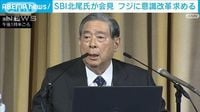On April 17, 2025, Yoshitaka Kitao, Chairman and President of SBI Holdings (HD), held a press conference in Tokyo, where he expressed his strong views regarding Fuji Television, which is currently facing significant challenges. Kitao has been nominated as one of the new director candidates for Fuji Media Holdings (FMH), the parent company of Fuji Television, by the U.S. investment fund Dalton Investments. This nomination comes amid calls for a comprehensive overhaul of the management structure at FMH, which has been plagued by scandals and poor performance.
During the press conference, Kitao unveiled his plans for reform, confidently stating, "Fuji's recovery is entirely possible." His remarks were aimed at instilling a sense of hope among stakeholders, as he emphasized the necessity for organizational and business reforms to revitalize the company. Kitao criticized FMH's newly announced structure as "insufficient," asserting that significant changes are essential for the company to regain its footing in the competitive media landscape.
FMH's stock price initially surged during the morning hours, reaching a year-to-date high of 3433 yen shortly after the press conference began to garner media attention. However, this optimism was short-lived. By early afternoon, the stock price fell sharply to 2950 yen, a drop of 265 yen (8.2%) from the previous day, due to what market insiders described as "profit-taking selling." Although there was a subsequent buying spree, the stock closed at 3031 yen, marking a decrease of 184 yen (5.7%) for the day. This volatility reflects the market's uncertainty regarding the effectiveness of Kitao's proposed reforms.
Kitao's nomination by Dalton Investments, a firm known for its activist shareholder approach, signals a potential shift in FMH's governance. The fund is pushing for a complete change of directors at the upcoming shareholders' meeting in June 2025. This situation has led to unease within Fuji Television, with insiders expressing mixed feelings about Kitao's return to the company. One veteran Fuji executive remarked, "The attitude has been changed this far," highlighting the tension surrounding the management reshuffle.
Reflecting on his past, Kitao acknowledged his previous misjudgment two decades ago when he acted as a "white knight" to protect Fuji from a hostile takeover attempt by Livedoor, led by Takafumi Horie. He admitted, "My judgment 20 years ago was terribly wrong," suggesting that had Horie taken the reins, Fuji might have evolved into a more competitive entity.
In his vision for Fuji's future, Kitao emphasized the need for a cultural shift within the organization. He stated, "If (the Fuji side) opposes (Mr. Kitao), we will win," indicating his readiness for confrontation should his proposals be met with resistance. He also pointed out that he would not acquire shares if FMH implemented his recommendations, suggesting a collaborative approach rather than a hostile takeover.
Among the proposals, Kitao highlighted the importance of separating the real estate business from the core media and content operations, which he believes should dominate the profit structure. He proposed establishing a new company that leverages Fuji's strong content, particularly its renowned anime, to tap into international markets. Kitao's strategy aims to integrate finance and IT with media, drawing inspiration from successful models in the United States.
In addition to his plans for structural reform, Kitao expressed support for Kenji Shimizu, the current president of Fuji Television, stating that he should "stay" as a director. Shimizu has garnered a relatively positive reputation within the company, with employees appreciating his logical and transparent communication style during challenging times.
However, not all executives share this optimism. Another veteran executive voiced skepticism, stating, "There is no sense of expectation," and noted that the situation has only worsened. The internal conflict reflects the broader concerns about FMH's ability to navigate its current crises and the effectiveness of Kitao's leadership.
As the June shareholders' meeting approaches, the pressure mounts on Kitao and Dalton Investments to deliver a viable plan that addresses the numerous issues plaguing Fuji Television. Investors are keenly watching how this unfolding drama will impact the company's future and whether the proposed reforms will translate into tangible improvements.
In conclusion, the situation at Fuji Television remains precarious, with significant challenges ahead. Kitao's ambitious plans for reform and revitalization will be put to the test as stakeholders await the outcome of the upcoming shareholders' meeting. The path forward is uncertain, but the stakes are high for one of Japan's most recognized media companies.







